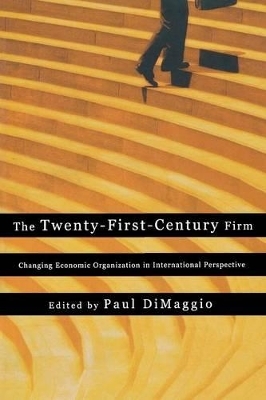
The Twenty-First-Century Firm
Princeton University Press (Verlag)
978-0-691-11631-0 (ISBN)
Students of management are nearly unanimous (as are managers themselves) in believing that the contemporary business corporation is in a period of dizzying change. This book represents the first time that leading experts in sociology, law, economics, and management studies have been assembled in one volume to explain the varying ways in which contemporary businesses are transforming themselves to respond to globalization, new technologies, workforce transformation, and legal change. Together their essays, whose focal point is an emerging network form of organization, bring order to the chaotic tumble of diagnoses, labels, and descriptions used to make sense of this changing world. Following an introduction by the editor, the first three chapters--by Walter Powell, David Stark, and Eleanor Westney--report systematically on change in corporate structure, strategy, and governance in the United States and Western Europe, East Asia, and the former socialist world. They separate fact from fiction and established trend from extravagant extrapolation.
This is followed by commentary on them: Reinier Kraakman affirms the durability of the corporate form; David Bryce and Jitendra Singh assess organizational change from an evolutionary perspective; Robert Gibbons considers the logic of relational contracting in firms; and Charles Tilly probes the deeper historical context in which firms operate. The result is a revealing portrait of the challenges that managers face at the dawn of the twenty-first century and of how the diverse responses to those challenges are changing the nature of business enterprise throughout the world.
Paul DiMaggio is Professor of Sociology at Princeton University. He has written widely in the fields of organization theory, economic sociology, and sociology of culture, and is coeditor, with Walter Powell, of "The New Institutionalism in Organizational Analysis".
CHAPTER 1: Introduction: Making Sense of the Contemporary Firm and Prefiguring Its Future by Paul DiMaggio 3 PART ONE: Portraits From Three Regions 31 CHAPTER 2: The Capitalist Firm in the Twenty-First Century: Emerging Patterns in Western Enterprise by Walter W. Powell 33 CHAPTER 3: Ambiguous Assets for Uncerta in Environments: Heterarchy in Postsocialist Firms by David Stark 69 CHAPTER 4: Japanese Enterprise Faces the Twenty-First Century by D. Eleano Westney 105 PART TWO: Commentaries 145 CHAPTER 5: The Durability of the Corporate Form by Reinier Kraakman 147 CHAPTER 6: The Future of the Firm from an Evolutionary Perspective by David J. Bryce and Jitendra V. Singh 161 CHAPTER 7: Firms (and Other Relationships) by Robert Gibbons 186 CHAPTER 8: Welcome to the Seventeenth Century by Charles Tilly 200 CHAPTER 9: Conclusion: The Futures of Business Organization and Paradoxes of Change by Paul DiMaggio 10 References 45 Index 71
| Erscheint lt. Verlag | 22.7.2003 |
|---|---|
| Verlagsort | New Jersey |
| Sprache | englisch |
| Maße | 152 x 235 mm |
| Gewicht | 369 g |
| Themenwelt | Technik |
| Wirtschaft ► Betriebswirtschaft / Management | |
| Wirtschaft ► Volkswirtschaftslehre ► Mikroökonomie | |
| ISBN-10 | 0-691-11631-8 / 0691116318 |
| ISBN-13 | 978-0-691-11631-0 / 9780691116310 |
| Zustand | Neuware |
| Haben Sie eine Frage zum Produkt? |
aus dem Bereich


